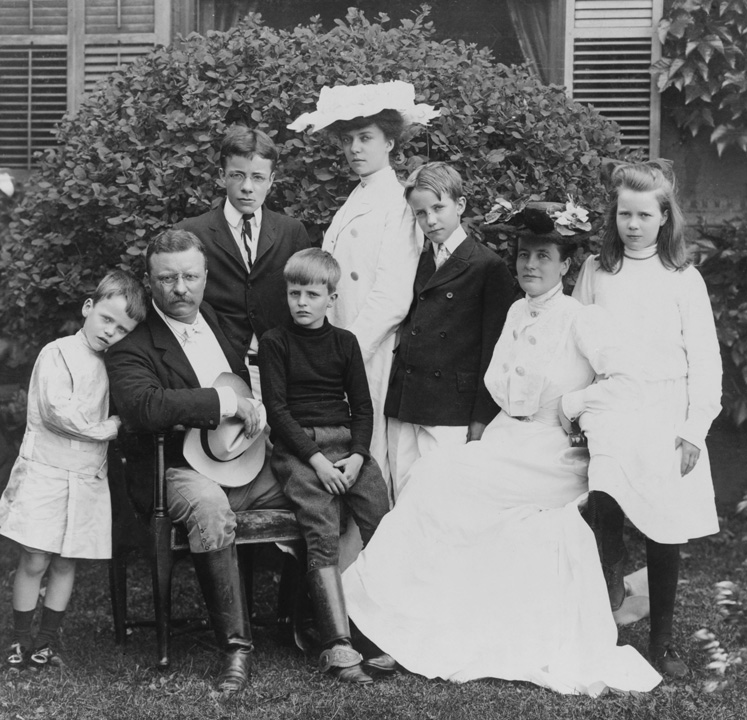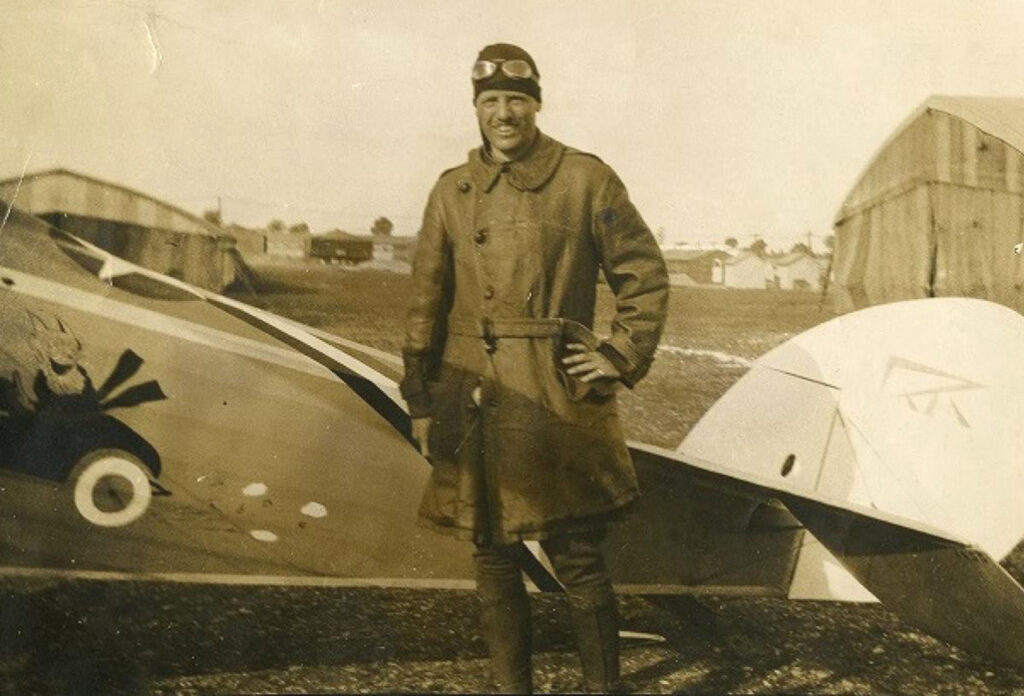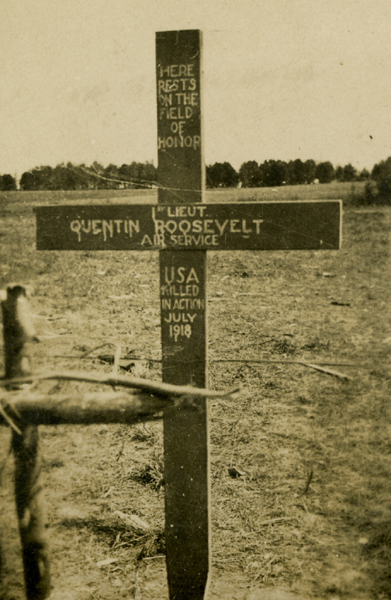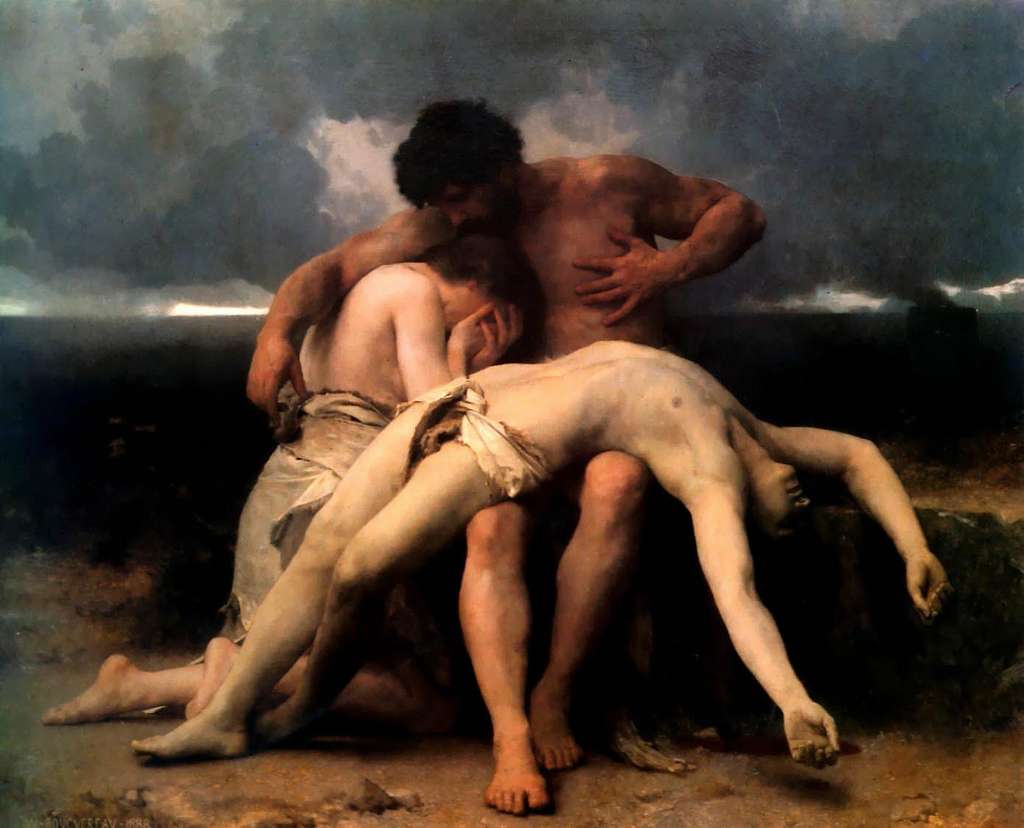Theodore Roosevelt led a boisterous, strenuous life. That all changed with the loss of his son Quentin in the First World War. “To feel that one has inspired a boy to conduct that has resulted in his death,” the ex-President wrote, “has a pretty serious side to a father.” Self-reproach and regret came to dominate his private moments. Roosevelt died in January, 1919, six months after writing those words.
Roosevelt was no stranger to death. While the real-life cowboy and explorer may have enjoyed an anticipatory nostalgia for the mythological West, he never lost sight of its harsh realities. “The men who have shared in the fast vanishing frontier life of the present feel a peculiar sympathy with the already long-vanished frontier life of the past,” he wrote in his preface to The Winning of the West in 1889. Roosevelt spoke from experience. Terrible grief had once led him to seek solace in the Dakota plains he adored.
Roosevelt’s mother and wife died the same day: February 14, 1884. His mother succumbed to typhoid fever. His wife had given birth two days earlier to a girl. Weakened, she died of Bright’s disease, a kidney ailment. Later that year Theodore entrusted the infant to his sister and left for the Dakota territories, where he spent two years as a rancher and sheriff. He returned to New York in 1886 and soon after married his second wife, Edith.
These experiences shaped Roosevelt. He understood childish yearnings, accepted them for what they were, but never allowed them to overcome his good sense. A close friend of Owen Wister, Roosevelt helped edit and correct the initial manuscript of the well-known novel, The Virginian. Wister dedicated the book to Roosevelt.
This mix of man and boy helped mold Roosevelt into what in many ways has become a symbol of the quintessential American male, a symbol vibrantly alive to his own children. “He represented the final distillation of the Western experience,” observed historian Dee Brown, “and as President he did much to imprint these traits into the American ethos where they endure to this day.”

Roosevelt recognized that his longing for adventure was at times a bit of boyishness. When in 1913, at age fifty-five, the ex-President undertook a leisurely cruise down the Amazon, he coyly admitted it was his “last chance to be a boy again.” Later he chose to forego his scheduled trip for an arduous trailblazing trek down the River of Doubt, a man’s work about which he had no childish fantasies. The difference was absolutely clear to him. “I don’t in the least mind risk to my life,” he wrote, “but I want to be sure that I am not doing something for which I will find my physical strength unequal.” To Roosevelt, jaunts in search of masculinity were the play of boys; reasoned wariness was the province of men.
Recalling his time in the West while campaigning for vice president in 1900, Roosevelt told a crowd in Medora, North Dakota: “Here is where the romance of my life began.” And so it did. “We who have felt the charm of the life, and have exulted in its abounding vigor and its bold, restless freedom,” he admitted, “will not only regret its passing for our own sakes, but must also feel real sorrow that those who come after us are not to see, as we have seen, what is perhaps the pleasantest, healthiest, and most exciting phase of American existence.”
This echoed a sentiment Roosevelt had nurtured his entire life, one his sons knew and took to heart. “These outrages are, as a rule, the work of the roughs and criminals who always gather on the outskirts of civilization and who infest every frontier town,” wrote Roosevelt in 1888, “until the decent citizens become sufficiently murderous and determined to take the law into their own hands and drive them out.” The same civilizing spirit of justice was part of Roosevelt’s less-eloquent bombast during the war years, yet he was undeniably aware of the dangers involved.
The distinction between fantasy and reality is important. Later, after his son Quentin died, Roosevelt allowed grief to obscure reason. He felt certain, somehow, that he had inspired his son to the military action that led to his death.

At the outset of the First World War, Roosevelt petitioned Woodrow Wilson to raise another contingent of Rough Riders cavalry. His request was denied. His son, Quentin, on the other hand, served in the United States Army Air Service. Two of Roosevelt’s sons were already in the war. Quentin was “the last of the lion’s brood” to go, as Roosevelt put it. He celebrated his son’s first dogfight.
On July 14, 1918, Quentin Roosevelt was shot down in his French biplane fighter aircraft, the Nieuport 28 C.1. He was “tail-end Charlie” that day—the last plane in his formation.
Quentin had spotted three German aircraft approaching. He immediately broke off and rose alone to meet them. He made “repeated attacks” until, in a duel with an experienced non-commissioned officer who had flown with Manfred von Richthofen (the Red Baron), Quentin’s aircraft was downed.
His German opponents landed. Their propaganda office required that they take a photo of the body. Having dispensed with this distasteful task, they buried him with full military honors, using wire from the Nieuport to erect a wooden cross. Within days, Americans took the area and marked the grave with a cross of their own, around which French soldiers later built an enclosure of wood.

By the time the death appeared in the newspapers, Roosevelt had already been informed. He tried to go on as usual, but at a luncheon with Albert Shaw of the Review of Reviews, he was unusually quiet. “Don’t give up hope, Colonel,” Shaw said when he arrived. “The news may not be true.”
“No,” said Roosevelt. “Quentin’s dead. Quentin’s dead.”
Quentin’s parents dealt with their loss differently. Roosevelt had a blustery persona that is often misunderstood, but beneath it was a great breadth and depth of feeling for his children and a subtle, tactful, resolute nature that showed itself at home and while in the White House.
Quentin’s mother, Edith, was adamantine in her dealings, graceful and disciplined. She had always said, “You cannot bring up boys as eagles and expect them to turn out sparrows.” Such homilies were very much her way. Just as others misunderstood Theodore’s bombast, few visitors perceived the grief that lay within her composed resolve.
In August, a month after Quentin died, Nicholas Roosevelt visited prior to his leaving for service in France. “When she saw me in uniform her eyes filled with tears and she turned away,” he wrote. “Then she put her hand on my arm and said: ‘I’m all right, Nick; I’m all right.’ And she was.”
Roosevelt knew his wife better than that. On August 10, 1918, he wrote to their son Kermit: “Mother will carry the wound green to her grave.” That same month, Roosevelt told Edith Wharton, “There is no use writing about Quentin for I should break down if I tried.”
By the end of August he managed to write a generalized eulogy for all the young men dying in Europe. “Only those are fit to live who do not fear to die; and none are fit to die who have shrunk from the joy of life and the duty of life.” This tribute, “The Great Adventure,” ran in newspapers on September 17, 1918 and in the October 1918 issue of Metropolitan magazine. Near the end, his article’s tone grew weak and sentimental. The task of writing about his son so soon after the boy’s death was beyond him.
No eulogies could be more eloquent than Roosevelt’s cries of grief: sitting for hours in his son’s room, whispering, “Quen-tee;” rocking in the chair on which he had held his children, repeating in liturgy, “Poor Quinikins;” or when he was heard sobbing into the mane of his son’s pony, “Poor Quentyquee!”
Quentin’s sister, Alice, quoted the Book of Job to express their family’s heartbreak: “The stout lion’s whelps are scattered abroad.” When General Peyton C. March asked about moving Quentin’s remains, Roosevelt also relied on scripture, this time Ecclesiastes. “Where the tree falls,” he wrote March, “there let it be.”
Roosevelt blamed himself for his son’s death. A careful reading of Roosevelt’s papers and letters clearly demonstrate a father’s burden of grief and guilt. He felt that his aggressive martial convictions had led all four of his sons to volunteer for military service. “It is rather awful to know that he paid with his life,” Roosevelt wrote of Quentin on September 20, “and that my other sons may pay with their lives, to try to put in practice what I preached.”
On October 27, 1918, Roosevelt turned sixty. Two days later, Edith wrote to their son Kermit that his apparent stoicism was a facade. “Quentin’s death shook him greatly,” she wrote, adding that the physical discomfort of his rheumatism was aggravated by grief. “I can see how constantly he thinks of him and not the merry happy silly recollections which I have but sad thoughts of what Quentin would have counted for in the future.”
Owen Wister visited the Roosevelts in late October. On leaving, he wrote: “They stood at their hall door as I drove off, stood watching, after their words bidding me to come again soon, she quiet beside him, he waving his hand: Quentin’s father and mother, carrying on.”
Three months had passed since their son’s death, but as was readily apparent to Wister, it might have been three days. An acquaintance that saw Roosevelt around the same time noted that the “old exuberance” was gone “and the boy in him had died.”
Theodore Roosevelt died on January 6, 1919. Edith travelled to France the following month. She had a fountain and stone marker erected for Quentin in Chamery. The memorial’s engraving was taken from Percy Bysshe Shelley’s elegy for John Keats, “Adonais”:
He has outsoar’d the shadow of our night
In 1955, Quentin was reinterred in the Normandy American Cemetery, abroad where he fell, as his parents wished.
Image Credit: William-Adoplhe Bouguereau, “The First Mourning” (1888) via Picryl












Thank you for this piece, sir. TR was a figure heretofore of not much interest to me, but I will now explore his life more fully.
Thank you. No doubt you have discovered a plethora of books on TR. There are many fine volumes, but to begin, I would suggest Edmund Morris’s compelling three-volume series. The first volume, “The Rise of Theodore Roosevelt,” won the Pulitzer in 1980. The other volumes, “Theodore Rex” and “Colonel Roosevelt,” have been equally popular. The narrative is rich in detail and never dull. Enjoy!
I have read a few books on TR and always considered him an interesting and mostly inspiring individual. Though I knew he lost a son in WWI I cannot remember ever reading anything about his reaction to his death. I am sure there was a line or two mentioning his grief but nothing specific and nothing I have retained. This was a memorable anecdote about the man and article I think, more so since I am raising my own children. Thank you.
Thank you. In fairness to the many excellent TR biographers, they usually have a tremendous amount of ground to cover within their pages. In addition, the study of bereavement and its impact on our lives is complex, highly specialized, and takes years of research — I’ve been at it constantly since my daughter died in 2015 and have only scratched the surface. When I come across a biography that seems to skip over loss and grief, I sometimes pause and think, “Thank God they have no idea how it feels. May they never know.” In a few weeks FPR will publish an essay on another bereaved father: Dwight Eisenhower. His story is quite different from TR’s, but the lifelong impact of the death is heartbreakingly similar. As sociologist and death studies pioneer Geoffrey Gorer observed, parental bereavement is “the most distressing and long-lasting of all griefs,” adding that “it seems to be literally true, and not a figure of speech, that the parents never get over it.” Presidents, alas, are no exception.
Comments are closed.